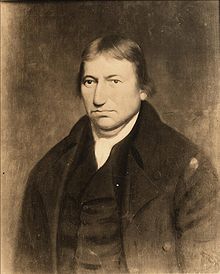John Archer | |
|---|---|
 | |
| Born | 5 May 1741 |
| Died | May 5, 1810 (aged 68) near Churchville, Maryland, U.S. |
| Resting place | Churchville Presbyterian Church Churchville, Maryland, U.S. |
| Education | West Nottingham Academy |
| Alma mater | Princeton College (AB,AM) College of Philadelphia |
| Occupations |
|
| Spouse |
Catherine Harris (m. 1766) |
| Children | Stevenson Archer Thomas Archer |
| Relatives |
|
John Archer (May 5, 1741 – September 28, 1810) was a prominent physician, slaveowner, and U.S. Congressman from Maryland, representing the sixth district for three terms from 1801 to 1807. His son, Stevenson Archer and grandson Stevenson Archer II were also Congressmen from Maryland.
Early life[edit]
Archer was born on May 5, 1741, near Churchville in the Province of Maryland, and attended the West Nottingham Academy in Cecil County, later graduating from Princeton College in 1760 with a Bachelor of Arts and in 1763 with a Master of Arts. He studied theology, but owing to a throat affliction, he abandoned his studies in that area and began the study of medicine. He graduated as a physician from the College of Philadelphia on June 21, 1768, receiving the first medical diploma issued on the American continent.[1][2][3]
Career[edit]
In July 1769, Archer commenced the practice of law in Harford County.[3] He was a member of the Revolutionary committee from 1774 to 1776, and later raised a military company during the American Revolutionary War.[1][3] He was a member of the first state constitutional convention of 1776,[3] and served in the Maryland House of Delegates from 1777 to 1779.[1] During the Revolutionary War, Archer was volunteer aide-de-camp to General Anthony Wayne at Stony Point. On June 1, 1779, Archer was made a captain and subsequently a major in the Continental Army.[1]
Archer was elected as a Democratic-Republican to the Seventh, Eighth, and Ninth Congresses, serving from March 4, 1801, until March 3, 1807. He founded, with his son Thomas Archer, the medical and chirurgical faculty of Maryland in 1799.[1] In 1810, Archer documented a case of superfecundation, more specifically called "heteropaternal superfecundation," in which a Caucasian woman gave birth to mixed twins — one Caucasian, one Afro-Caucasian - after having had intercourse with two men of differing race within a few weeks.[citation needed]
Personal life[edit]
Archer married Catherine Harris on October 18, 1766. His son was Stevenson Archer, chief justice.[3]

Archer died at his country home, Medical Hall, near Churchville, Maryland, on September 28, 1810, and is interred in the Churchville Presbyterian Church cemetery.[1][3]
Legacy[edit]
His great-grandson was Stevenson A. Williams.[4]
A descendant of Dr. John Archer, one Henry Wilson Archer and his wife Mary Elizabeth Walker Archer, bought the 65 acre farm "Shamrock" from Ellen Howe Davis in 1850. The farm was retained in the Archer family until 1955 when it was sold to the Sparr Construction Company to become the current development of Shamrock in Bel Air. The mansion on the property, along with 5 acres was purchased by Nicholas J. Bonge, and named the "Christian Bible Center". He had plans of restoring the home for a Christian orphanage. After his untimely death in 1961, it was resold and, sadly, burned to the ground by a contingent of 70 Harford County Firemen in October 1963 to make way for the development.<Historical Society of Harford County>[citation needed]
John Archer School, a special education school built in 1971 in Bel Air was named after Archer. In June 2022, the school board voted to rename the school to Harford Academy on Campus Hill due to Archer's ownership of slaves.[5]
References[edit]
- ^ a b c d e f "Archer, John". Biographical Directory of the United States Congress. Retrieved November 27, 2022.
- ^ Kelly, Howard A.; Burrage, Walter L. (eds.). . . Baltimore: The Norman, Remington Company.
- ^ a b c d e f Preston, Walter Wilkes (1901). History of Harford County. pp. 200–202. Retrieved November 27, 2022.
- ^ History of the Western Insurrection. Vol. 4. B.F. Johnson, Incorporated. 1912. pp. 135–138.
- ^ Roberts, Tony (June 14, 2022). "Harford school board decides on new names for schools named after slave owners". Yahoo! Sports. Archived from the original on February 16, 2023. Retrieved February 16, 2023.
External links[edit]
 Media related to John Archer (Maryland politician) at Wikimedia Commons
Media related to John Archer (Maryland politician) at Wikimedia Commons